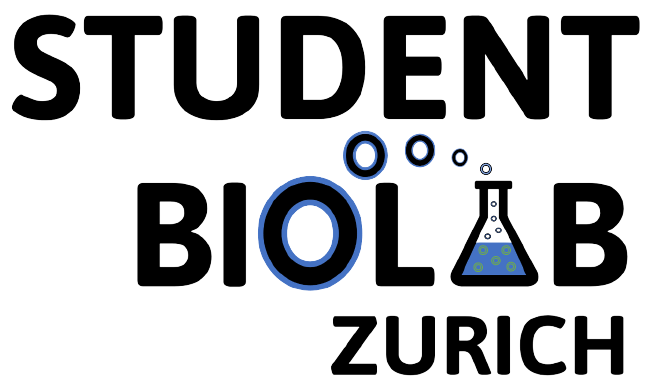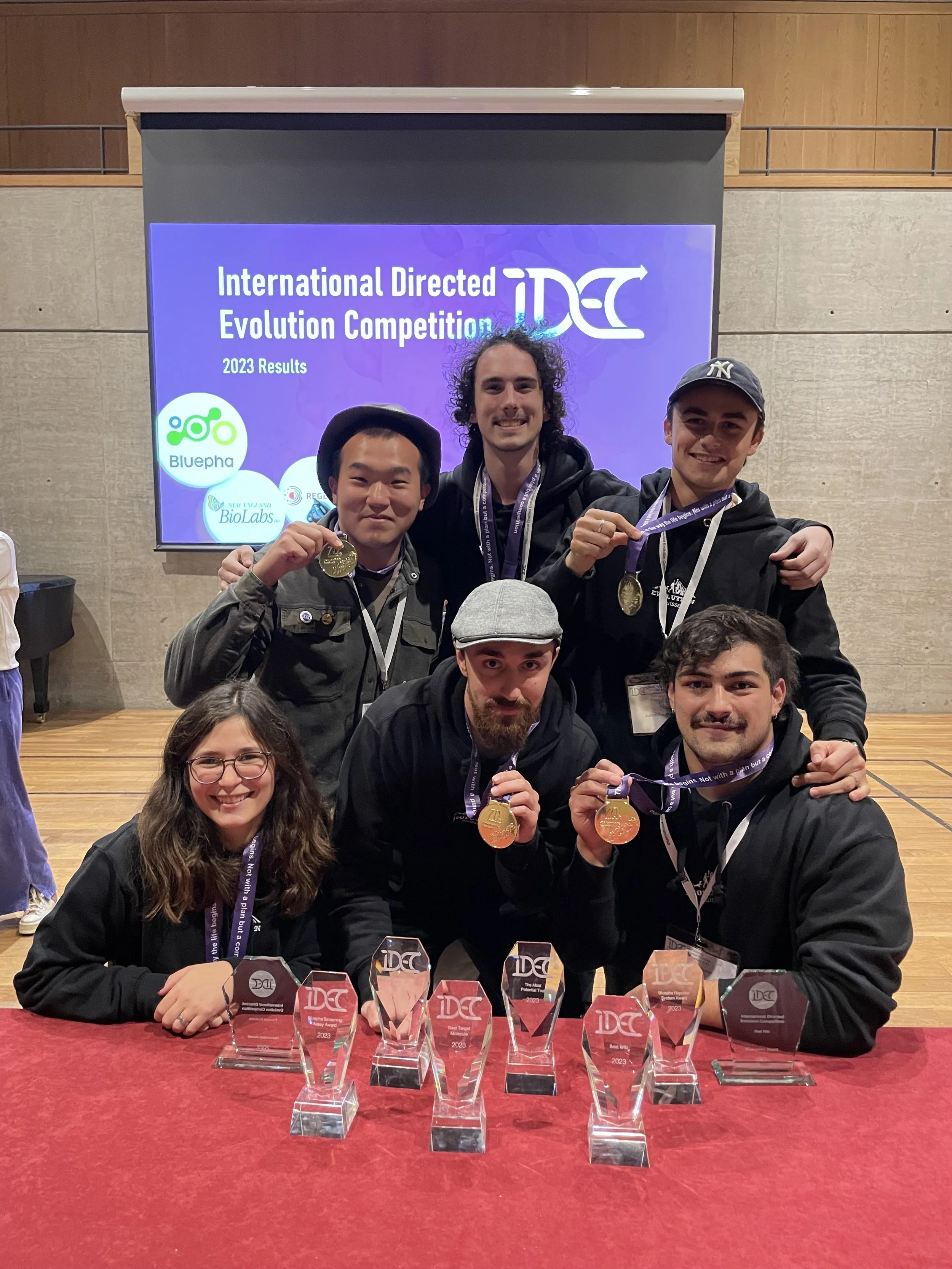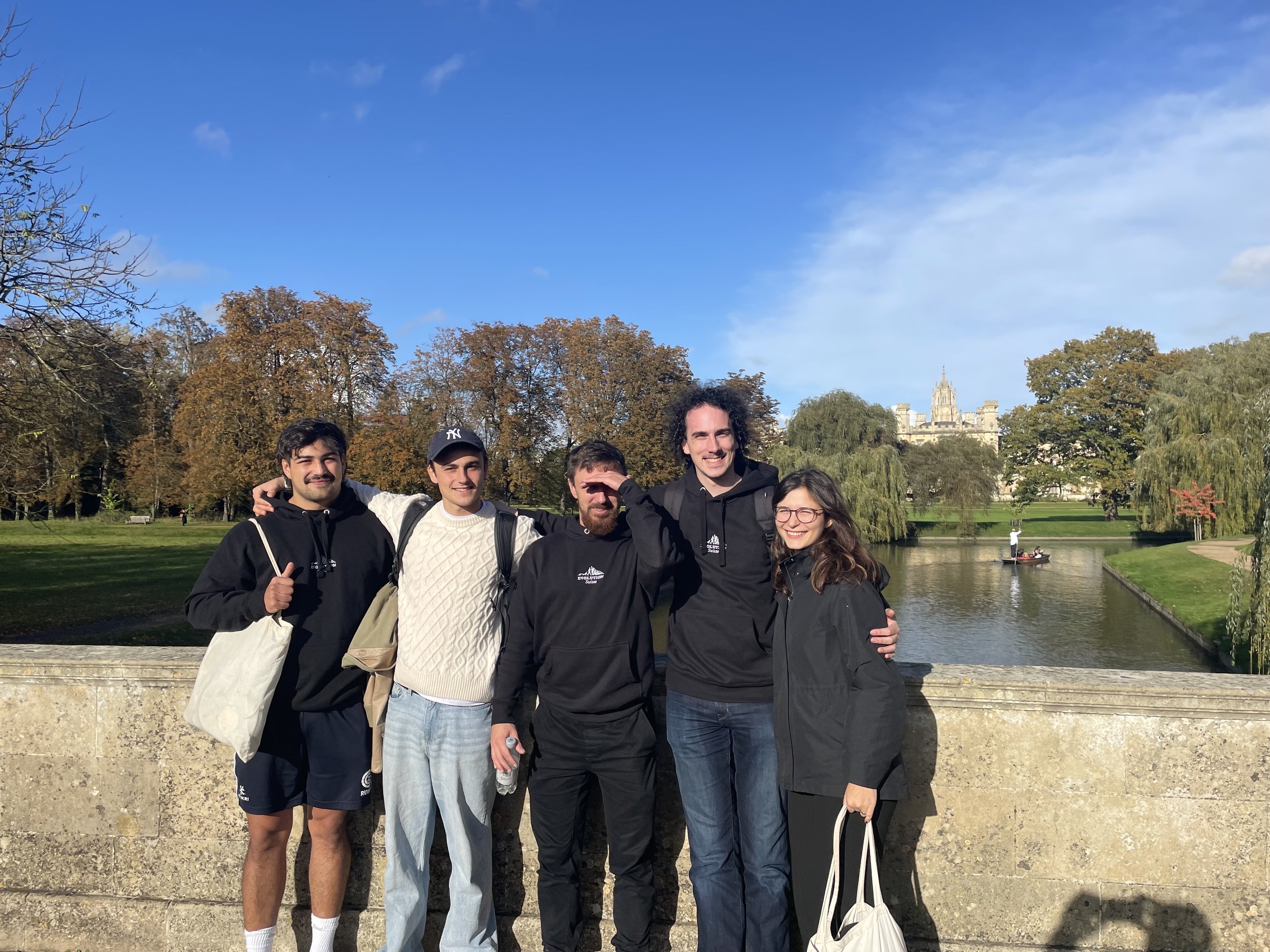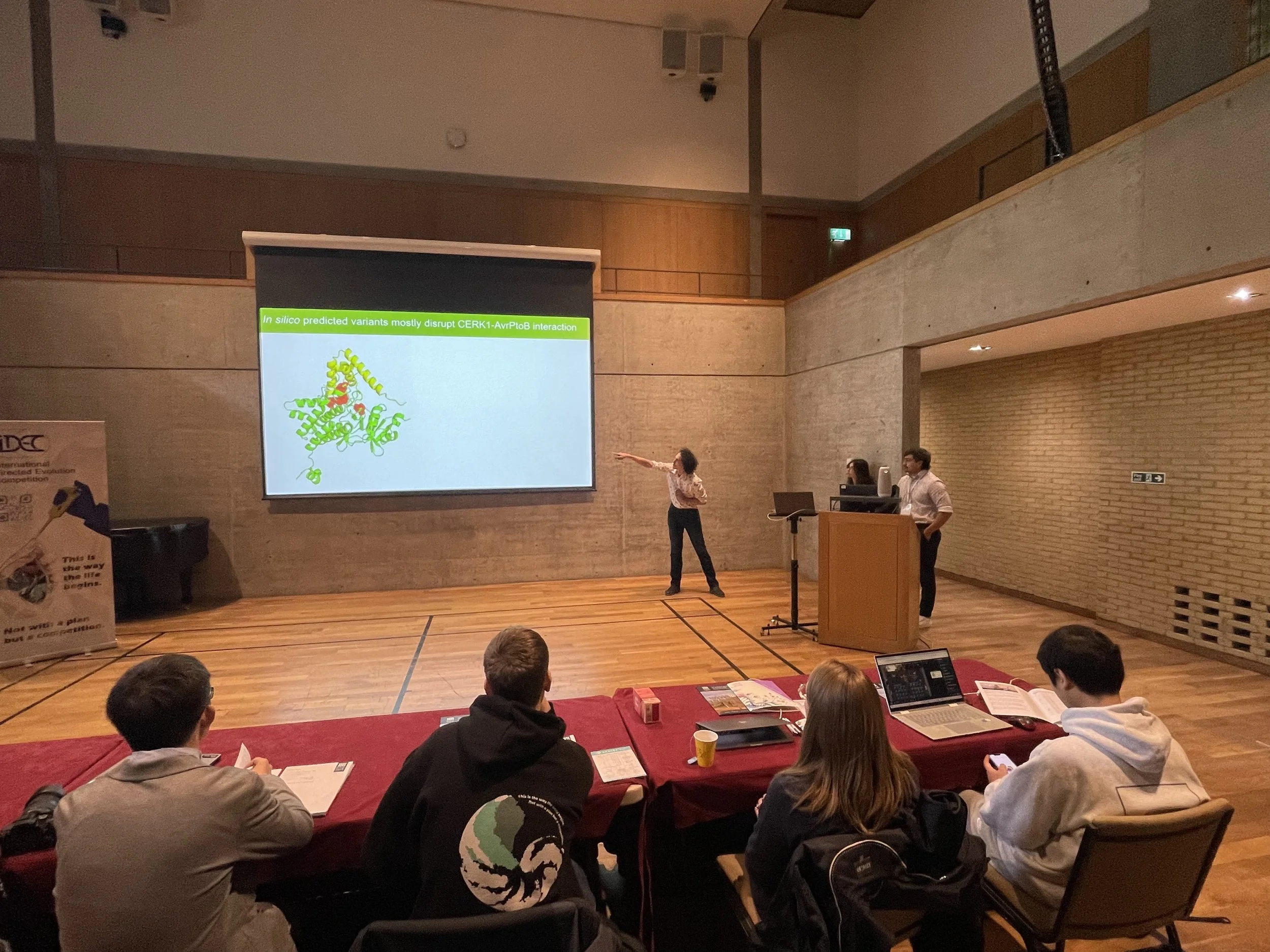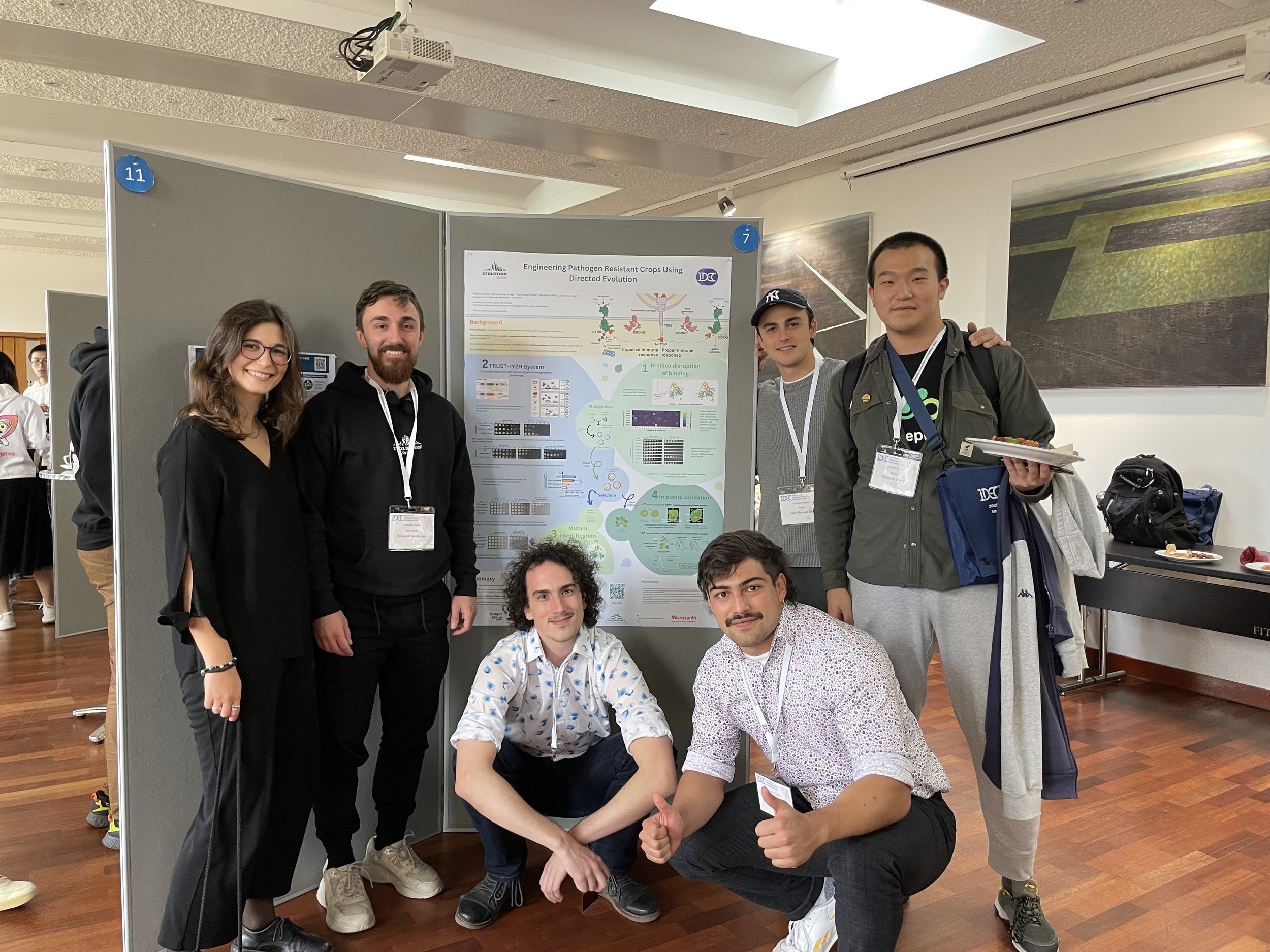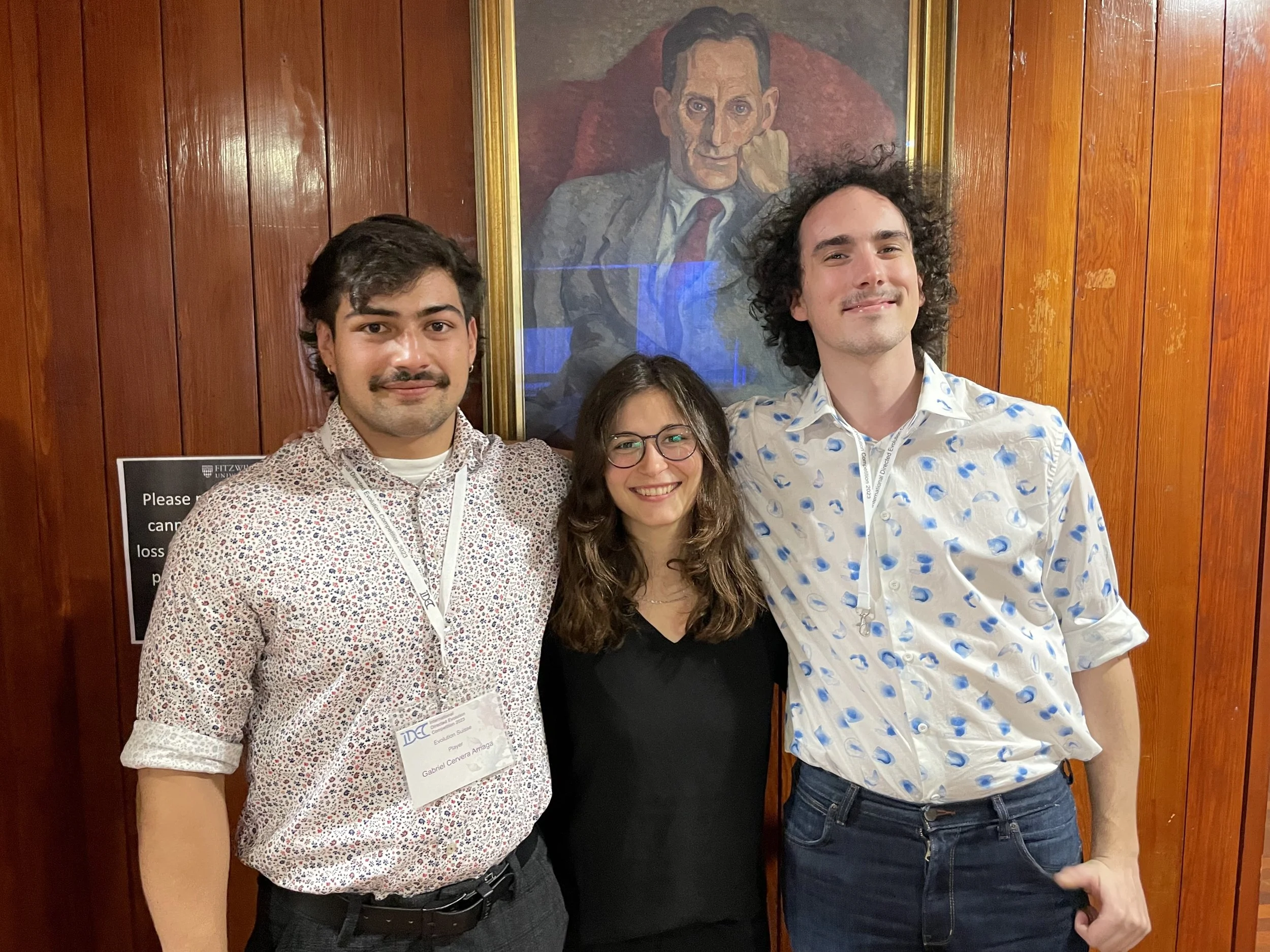
Directed Evolution
Directed evolution is a Nobel Prize-winning technique that mimics the process of natural selection to evolve biological molecules and organisms. It involves repeated application of mutagenesis to generate a genotypic library, followed screening to isolate variants that exhibit desired traits.
Directed Evolution has been been proven a power technique capable of creating enzymes with improved catalytic rates, optimizing metabolic pathways to increase yield, improving affinities of antibodies and much more.
Our goal is to explore the limits of Directed Evolution to find new exciting techniques and applications.
Every year we come up with an interesting and ambitious project in the area of directed evolution. Together as a team, we brainstorm ideas, design experiments, and execute them. We also secure funding, reach out to professors and companies for scientific support, and do whatever else is necessary to complete the project successfully. At the end, we present our results at an International Directed Evolution Competition.
For example, our team in 2023 used Directed Evolution to engineer pathogen immunity in plants, while in 2024 we leveraged cutting-edge approaches to engineer targeted protein degradation tools. Both times, our results were well-received, earning us gold medals and multiple awards at the iDEC festival. This year, we’re eager to assemble another team and build on our past success.
Topic for 2025 - Stay tuned
We are still brainstorming potential project directions for Evolution Suisse 2025 and will update this section soon. However, the new team will handle the specifics regarding the topic and implementation.
Recruiting: Core Team Members for 2025 team
We’re recruiting Core Team Members—a group of motivated, capable students who will be the main drivers of the project. Directed evolution combines traditional wet-lab work with computational approaches, so we welcome students interested in either or both areas. Expect hands-on experience with molecular cloning, protein and enzyme assays, in silico modeling, mutation analysis, and more. Who knows—we might even work with cutting-edge methods like PACE, SELEX, or Phage Display!
What does being a part of an iDEC team mean for you?
Your Own Research Project
This is more than just pipetting; you’ll have the opportunity to set the scientific direction and design the entire experiment plan together with the rest of the team.Collaborate with a Great Team
You get to work alongside talented and motivated students who share your passion for research. Likewise, you receive support from past members of Evolution Suisse in realizing your project and ideas.Gain Valuable Experience
From literature reviews and lab techniques to scientific communication, this project will prepare you well for your future career.Compete in the iDEC Competition
Travel to an international conference to showcase your results, connect with other teams from around the world, network with leaders in the field, and enjoy the chance to win prizes and awards. Celebrate at the after-party—all expenses covered!
What makes a great iDEC participant?
Read, analyze, and present scientific papers. You’ll need to understand specific topics and generate actionable research proposals based on the insights you synthesize.
Design an experimental plan to address a scientific question. For each experiment, you’ll conduct literature research to explore available methods, prepare lab protocols, and select the most effective approach.
Learn new lab techniques and protocols. While we’ll support you, especially in the early phases, you will need to proactively seek out knowledge and resources.
Troubleshoot and optimize experiments. Experiments may not always go as planned, so you’ll need to hypothesize potential issues, refine your approach iteratively, and improve protocols as necessary.
Communicate project results effectively through presentations, manuscripts, and posters.
Collaborate as part of a team. Clear communication is essential—you’ll need to express your ideas openly and be receptive to those of your teammates.
This may sound daunting at first, and some experience certainly helps in successfully participating in an iDEC project. However, we’ve found that most of these skills can be learned and improved along the way. We also plan to have a group of more experienced iDEC members available to support you during the initial stages of the project.
We want to emphasize that being part of the iDEC Core Team is a significant time commitment. The team is expected to work part-time during the Brainstorming and Planning phases, nearly full-time during the Surge phase in the summer, and then return to part-time during iDEC Prep (see below for the timeline of different project phases). This means that you'll need to have a few hours available each week during parts of the Spring and Autumn semesters, as the final deadline for the project is typically at the end of October. During the summer, the project requires nearly full-time engagement, comparable to a summer internship. That said, we’re all students, and we understand the need to balance this commitment with exam periods, holiday breaks, and other activities. Team members are not expected to work during their exams or forgo holidays entirely, but transparency about your availability is essential. Being open from the start about your schedule will help the team plan around everyone’s needs. To this end, we also encourage you to connect with our alumni to hear firsthand about their experiences and the time commitment at the info event on November 14th.
Apply by sending a short motivation statement and your CV to idec2025@studentbiolab.ch by 3rd of December 2024.
Timeline
Nov - Dec
1st Recruiting Wave
We will form the Core Team. See the call for applications above.
Dec - Mar
Brainstorming
During this phase we will explore several potential ideas and create the high-level concept of the final project.
March
2nd Recruiting Wave
If necessary, we will recruit people with the specific expertise, required for the successful completion of the selected project.
March - May
Planning
We will develop an experimental plan, make the necessary preparations, and start with first experiments.
June - Sep
Surge
This is the main phase of the project, during which the majority of lab work, both wet and dry, will take place. You can expect a lot of hard work, but also plenty of fun.
Sep - Oct
iDEC
In the autumn we will slowly ramp down the experiments and prepare results to be showcased during iDEC conference.
FAQ
-
The application process is straightforward. To apply, please send us a short motivational letter and your CV to idec2025@studentbiolab.ch by December 3, 2024. After reviewing applications, we will contact you regarding next steps, which typically include an interview with members of the previous team. In this interview, we’ll discuss directed evolution, your previous lab experience, and your motivations. Don’t worry; we don’t bite! The interview is simply a chance for us to get to know you better, and for you to ask any questions you may have about the whole ordeal.
-
We want to emphasize that being part of the iDEC Core Team is a significant time commitment. The core team is expected to work part-time during the Brainstorming and Planning phases, nearly full-time during the Surge phase, and then return to part-time during iDEC Prep.
While it’s realistic to take a few classes alongside the iDEC project, managing a full 30 ECTS course load or a thesis in parallel may not be feasible. Ultimately, the decision about your availability is yours; this recommendation is based on our experience over the past two years.
-
Yes, it’s possible to participate in a supporting role, especially if you have specialized skills needed for the project, such as FACS, electrical engineering, etc. These roles are typically advertised after the Brainstorming phase.
We’re also always open to more senior individuals, such as PhD students, interested in advisory roles, particularly during the project’s Brainstorming and Planning phases.
-
Each department has specific criteria for awarding ECTS credits, so we cannot guarantee you will receive them for participating in the iDEC project. However, we are happy to assist you in communicating with your study administration regarding this process.
-
We’re a graduate-level team, primarily aimed at late-Bachelor and Master’s students, and we encourage team members to become independent in the lab after initial training. Some basic level of laboratory experience (pipetting, setting up simple reactions…) is preferred, but we’re more than happy to support those eager to learn along the way, as long as they bring a willingness to learn, troubleshoot, and adapt.
If you are a complete beginner, don’t worry Student BioLab still has something to offer! For example, you might also consider applying for the iGEM teams.
-
While iGEM projects encompass a broader spectrum of research fields, iDEC projects are exclusively focused on using directed evolution to solve pressing issues or generate novel biological insights. While this might seem limiting, it is far from it! Directed evolution has been employed to evolve faster and more efficient enzymes, create industrially relevant microbial strains, develop more precise gene-editing tools, optimize the use of non-canonical amino acids, and much more.
Additionally, while a significant portion of iGEM projects involves extensive scientific communication and outreach to the public and stakeholders, iDEC projects are more research-oriented, with a strong focus on the scientific journey itself. This makes iDEC an excellent opportunity to experience day-to-day research in a more academic setting. But don’t worry—this doesn’t mean you won’t practice your scientific communication skills. We still prepare presentations, posters, and wikis to share our work!
Lastly, at iDEC, we tend to persue more ambitious projects compared to iGEM. in addition to presenting the project at the iDEC conference, we aim to use every project as a foundation for a publication or possible startup venture.
-
Our main goal is to generate interesting and novel results in the field of directed evolution that can act as a foundation for a scientific publication and/or a business venture.
Previous iDEC teams
Evolution Suisse 2024 - Developing novel Targeted Protein Degradation strategies
Diseases resulting from the accumulation of excess or misfolded proteins, or from unintended protein overactivity—such as Alzheimer’s, Parkinson’s, Huntington’s disease, and certain cancers—pose a major challenge in medicine. Targeted Protein Degradation (TPD) has emerged as a promising therapeutic approach, aiming to eliminate the problematic proteins driving disease progression. However, current TPD strategies can sometimes inadvertently affect healthy proteins, cause toxicity, or miss their intended targets. To address these limitations, Evolution Suisse, a team of 10 students from ETH and UZH, utilized a cutting-edge Phage-Assisted Continuous Evolution (PACE) technique to develop a more precise method of TPD. Our approach would specifically target disease-associated proteins while minimizing off-target effects and toxicity, paving the way for safer and more effective treatments.
Evolution Suisse 2023 - Creating pathogen-resistant crops.
Crop diseases caused by pathogens and pests present a significant global burden on agriculture, reducing harvests and ultimately impacting both the economy and the environment. Currently, pesticides are used to protect crops; however, they can harm the environment and pose health risks to humans. While plants have natural immune systems to defend against pathogens, pathogens often evolve ways to sabotage these defenses. To help plants gain an advantage in this ongoing "arms race," a group of 8 students from ETH and UZH worked on creating plant immune receptors that are can’t be sabotaged.
